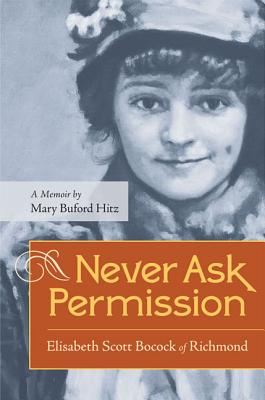Never Ask Permission: Elisabeth Scott Bocock of Richmond

Never Ask Permission: Elisabeth Scott Bocock of Richmond
Some cities, through hardship or glory or a combination of both, produce extraordinary women. Richmond in the early twentieth century, dominated by its prominent families and still haunted by the ghosts of its Confederate past, produced a galaxy of such characters, including Ellen Glasgow, Mary Cooke Branch Munford, and Lila Meade Valentine. Elisabeth Scott Bocock, Victorian in values but modern in outlook, carried on this tradition with her unique combination of family wealth and connections, boundless energy, eccentricity, and visionary zeal. Her daughter Mary Buford Hitz's candid memoir reveals the pleasures and frustrations of growing up with a woman who expected so much from her children and from the city whose self-appointed guardian she became.Elisabeth Bocock's vision was of a city that would take historic preservation seriously, of a society that would accept the importance of conservation. Impatient with process and society's conventions, she used her enormous personal magnetism to circumvent them when founding many of the institutions Richmond takes for granted today. In the creation of the Historic Richmond Foundation, the Carriage Museum at Maymont, the Hand Workshop, and the Virginia Chapter of the Nature Conservancy she played the dual roles of visionary and bulldozer. While part of a tradition of strong southern women, Elisabeth Bocock's tactics were unique, as she sought to convince others of both the practical and aesthetic links between preservation and the environment.One of the "five little Scotts," children of the founder of the investment firm Scott & Stringfellow, she grew up with great privilege, and she schooled her children in how to take advantage of such privilege and how to ignore it. Whether in their winter residence at 909 West Franklin Street in Richmond or at their summer home, Royal Orchard, in the Blue Ridge Mountains, in her household she insisted both on achievement and on avoiding boredom at all costs.As Mary Buford Hitz recounts with intelligence and feeling, her mother often seemed like a natural force, leveling anything that stood in its way but leaving in its wake a brighter, changed world. Never Ask Permission is not only a daughter's hones
Descrierea produsului
Some cities, through hardship or glory or a combination of both, produce extraordinary women. Richmond in the early twentieth century, dominated by its prominent families and still haunted by the ghosts of its Confederate past, produced a galaxy of such characters, including Ellen Glasgow, Mary Cooke Branch Munford, and Lila Meade Valentine. Elisabeth Scott Bocock, Victorian in values but modern in outlook, carried on this tradition with her unique combination of family wealth and connections, boundless energy, eccentricity, and visionary zeal. Her daughter Mary Buford Hitz's candid memoir reveals the pleasures and frustrations of growing up with a woman who expected so much from her children and from the city whose self-appointed guardian she became.Elisabeth Bocock's vision was of a city that would take historic preservation seriously, of a society that would accept the importance of conservation. Impatient with process and society's conventions, she used her enormous personal magnetism to circumvent them when founding many of the institutions Richmond takes for granted today. In the creation of the Historic Richmond Foundation, the Carriage Museum at Maymont, the Hand Workshop, and the Virginia Chapter of the Nature Conservancy she played the dual roles of visionary and bulldozer. While part of a tradition of strong southern women, Elisabeth Bocock's tactics were unique, as she sought to convince others of both the practical and aesthetic links between preservation and the environment.One of the "five little Scotts," children of the founder of the investment firm Scott & Stringfellow, she grew up with great privilege, and she schooled her children in how to take advantage of such privilege and how to ignore it. Whether in their winter residence at 909 West Franklin Street in Richmond or at their summer home, Royal Orchard, in the Blue Ridge Mountains, in her household she insisted both on achievement and on avoiding boredom at all costs.As Mary Buford Hitz recounts with intelligence and feeling, her mother often seemed like a natural force, leveling anything that stood in its way but leaving in its wake a brighter, changed world. Never Ask Permission is not only a daughter's hones
Detaliile produsului












